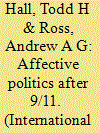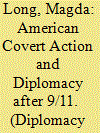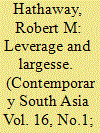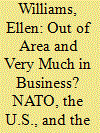| Srl | Item |
| 1 |
ID:
146143


|
|
|
|
|
| Summary/Abstract |
Affect and emotion are key elements of our lived experience as human beings but currently play little role in how we theorize actorhood in international relations. We offer six amendments for integrating affective dynamics into existing conceptions of individual-level actorhood in IR. From these amendments emerge the theoretical micro-foundations upon which we build propositions concerning potential collective-level affective dynamics and political strategies. We illustrate the analytical payoff of our proposals by examining the aftermath of the terrorist attacks on 11 September 2001. By amending existing understandings of actorhood to include human affective experience, we can integrate and make sense of a variety of psychological, social, and political consequences stemming from the attacks, both within the United States and internationally.
|
|
|
|
|
|
|
|
|
|
|
|
|
|
|
|
| 2 |
ID:
188630


|
|
|
|
|
| Summary/Abstract |
The relationship between American diplomats and intelligence officers has always been complex. The focus of American foreign policy and national security on counterterrorism efforts in the aftermath of the 9/11 terrorist attacks further shaped the dynamic between diplomats and intelligence officers in the field as well as their respective roles. The tension between diplomacy and covert action as policy-implementing tools was largely resolved to the benefit of the latter. Consequently, a new status quo emerged. Intelligence officers took a leading role in policy-implementation efforts through covert action, whilst the role of diplomats in the field evolved in line with counterterrorism-driven foreign policy and national security needs. This analysis introduces a new typology of diplomats in the twenty-first century, contrasting the multifaceted diplomatic activists, who advanced counterterrorism-driven diplomacy, against the traditionalists seeing this new diplomacy as bellicose and against American national interests.
|
|
|
|
|
|
|
|
|
|
|
|
|
|
|
|
| 3 |
ID:
080779


|
|
|
|
|
| Publication |
2008.
|
| Summary/Abstract |
Notwithstanding the close partnership between Washington and Islamabad that has developed over the past half-dozen years, Pakistan today is viewed by Americans as a country inimical to the interests and values of the United States. This article seeks to gauge the impact of Pakistan's close ties with Washington since 9/11. In important respects, the partnership has brought the government of Pervez Musharraf substantial benefits, including international legitimacy, the lifting of US sanctions, debt relief, access to sophisticated technology, a helpful American role in reducing tensions with India, and massive amounts of economic and military assistance. Yet the vast majority of the Pakistani people have an unfavourable view of the United States-in part because of its military engagements in Afghanistan and Iraq, but in good measure because the policies of the George W. Bush administration have served to sustain Musharraf's hold on political power. Desirous of avoiding contentious issues for fear of exacerbating Pakistani apprehensions of abandonment, the Bush administration has never spelled out at what point Pakistani misbehaviour would cause it to rethink the virtues of the blank cheque. As a consequence, it has failed to lay the groundwork for an enduring bilateral partnership once Musharraf has left the scene
|
|
|
|
|
|
|
|
|
|
|
|
|
|
|
|
| 4 |
ID:
081292


|
|
|
|
|
| Publication |
2008.
|
| Summary/Abstract |
This paper seeks to determine why the United States chose to bypass NATO after the September 11, 2001 terrorist attacks and the relative strengths and weaknesses of alliance and coalition operations, through an examination of NATO's missions in Bosnia and Kosovo and U.S.-led coalition operations in Afghanistan and Iraq. While the United States emerged from NATO's two Balkans missions with a belief that its operational freedom and flexibility had been hampered by operating within alliance constraints, coalition operations in Afghanistan and Iraq raised key questions about whether ad hoc coalitions are the most appropriate mechanisms for conducting such operations. NATO's contributions to postcombat reconstruction and stabilization also highlighted some of the core advantages to be derived from working through the alliance. If NATO can follow through on the transformation agenda it has undertaken since the 2002 Prague Summit, the indications are that the United States is more likely to turn to NATO for future operations and that NATO's days as a "toolbox" may well be numbered.
|
|
|
|
|
|
|
|
|
|
|
|
|
|
|
|